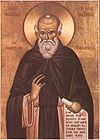August 30 (Eastern Orthodox liturgics)
Appearance

August 29 - Eastern Orthodox liturgical calendar - August 31
All fixed commemorations below are observed on September 12 by Eastern Orthodox Churches on the Old Calendar.[note 1]
For August 30th, Orthodox Churches on the Old Calendar commemorate the Saints listed on August 17.
Feasts
Saints
- Hieromartyr Philonidis (Philoneidis) of Cyprus (3rd century).[3] (see also: June 17)
- 6 Martyrs of Melitene, by drowning.[1][4]
- 16 Monk-martyrs of Thebes, by the sword.[1][5]
- Saint Bryaene of Nisibis (318)[1][6][7]
- Saints Alexander (340),[8] John VIII of Constantinople (595),[9] and Paul the New (784),[10] Archbishops of Constantinople and Ecumenical Patriarchs.[1][11]
- The Venerable Guardian (Grk.: Ὁ Ὅσιος Φύλαξ).[12][note 2]
- Venerable Sarmata of "The Paradise", ascetic of the desert, Egypt (c. 362)[1][7][13]
- Saint Eulalius, Bishop of Cyprus (4th century)[1][7][14]
- Saint Christopher of Palestine (Christopher the Roman, in Palestine) (6th century)[1][7][15]
Pre-Schism Western saints
- Saints Boniface and Thecla, parents of the Twelve Brothers commemorated on September 1 (c. 250)[16][note 3]
- Hieromartyr Felix,[note 4][note 5] and Martyrs Fortunatus, Septiminus and Januarius, by beheading (c. 304)[7][18]
- Saint Pammachius, a Roman senator, married to one of the daughters of St Paula (c. 340-410)[16][note 6]
- Saint Loarn, a disciple of St Patrick of Ireland (5th century)[16]
- Saint Rumon, a bishop and patron-saint of Tavistock in England (6th century)[16][note 7]
- Saint Agilus (Ail, Aile, Aisle, Ayeul) (c. 580-650)[16][note 8]
- Saint Fiacrius (Fiacre, Fiaker, Fèvre), Irish hermit and hospice-founder at Breuil in Brie (c. 670)[1][16]
- Saints Pelagius, Arsenius and Sylvanus, hermits near Burgos in Old Castile in Spain, martyred by the Saracens. (c. 950)[16]
- Venerable Fantinus of Calabria, the Wonderworker, in Thessalonica (974)[1][7][20][21][note 9]
- Saint Bononius, Abbot of Lucedio in Piedmont (1026)[16]
- Saint Peter of Trevi, he preached to the peasants of Tivoli, Anagni and Subiaco (c. 1050)[16]
Post-Schism Orthodox saints
- Synaxis of Serbian Hierarchs:[1][22][23]
- Saints Sava I (1235), Arsenius (1266), Sava II (1271), Eustathius I (1285), James (1292), Nicodemus (1325), and Daniel II (1338), Archbishops;
- Saints Ioannicius II (1354), Spyridon (1388),[24] Ephraim II (1395), Cyril (1419), Nicon (c. 1439), Macarius (1574),[25] and Gabriel I (1659),[26] Patriarchs;
- St. Gregory (1012), Bishop.
- Saint Alexander, Abbot of Vocha Monastery, near Galich (14th-15th century)[1]
- Repose of St. Alexander, Abbot of Svir (1533)[1][22][27]
- Saint Varlaam, Metropolitan of Moldavia (1657)[1][note 10]
New martyrs and confessors
- New Hieromartyr Peter, Priest (1918)[22]
- New Hieromartyr Paul, Priest and Virgin-martyr Elizaveta, and Martyr Theodore (1937)[22]
- New Hieromartyr Ignatius (Lebedev), Schema-Archimandrite of the Vysokopetrovsky Monastery (St. Peter’s Monastery), Moscow (1938)[1][22][note 11]
- New Hiero-confessor Peter Cheltsov, Archpriest, of Smolensk (1972)[1][7][22]
Other commemorations
- Uncovering of the relics (1652) of St. Daniel, great prince of Moscow (1303)[1][22][29]
- Translation of the relics (1724) of St. Alexander Nevsky (Alexis in schema), great prince of Novgorod (1263)[1][22][30][31]
- Translation of the relics of St. Guthlac, Hieromonk of Crowland.[22] (see also: April 11)
Icon gallery
-
Saint Fiacrius.
-
18th century icon of Alexander Svirsky.
Notes
- ^ The notation Old Style or (OS) is sometimes used to indicate a date in the Julian Calendar (which is used by churches on the "Old Calendar").
The notation New Style or (NS), indicates a date in the Revised Julian calendar (which is used by churches on the "New Calendar"). - ^ He is unknown in the Synaxaristes. He is recorded in the Jerusalemitic Codex 1096 p.123 as follows: "Memory of the blessed Patriarchs Alexander, John and Paul the New, and the Blessed Guardian" (see Dimitrievsky, Typica B, p. 55).[12]
- ^ They were martyred under Maximian in Hadrumetum, now Soussa in Tunisia in North Africa.
- ^ "At Rome, on the Ostian road, the martyrdom of the blessed priest Felix, under the emperors Diocletian and Maximian. After being racked he was sentenced to death, and as they led him to execution, he met a man who spontaneously declared himself a Christian, and was forthwith beheaded with him. The Christians not knowing his name, called him Adauctus, because he was added to St. Felix and shared his crown."[17]
- ^ Felix and Adauctus: Martyrs beheaded in Rome under Diocletian. St Felix was a priest and as he was being led to execution, a bystander confessed Christ and was martyred with him. Because this second martyr's name was not known, he was called Adauctus, i.e., the one added. They were buried on the Ostian Way.[16]
- ^ On the death of his wife in 395, Pammachius became a monk and spent the rest of his life and his immense wealth in the service of the sick and the poor.
- ^ "ST. RUMON, or RUAN, was a native of Ireland, and a bishop, it is said, who came to Cornwall to end his days in holy solitude. He chose a cell in a certain forest in Cornwall, which then abounded in wild beasts. In this spot he devoted himself to his pious practices, and in God's good time was called to his heavenly reward. About the year 981, when Duke Ordulph had completed the monastery at Tavistock which his father had begun, the relics of St. Rumon were solemnly translated to that church, and were there nobly enshrined. He was regarded with great veneration, as one of the special patrons of that foundation. St Ruan in Cornwall is near the Lizard Point, and several churches in the parish or neighbourhood are dedicated in his honour, as also the Church of Romans Leigh, in Worcestershire. Malmesbury saw the shrine of the Saint at Tavistock, but could learn no particulars of his life."[19] Romansleigh in Devon is named after him.
- ^ A young nobleman who became a monk with St Columbanus at Luxeuil. He remained at Luxeuil under the founder's successor, St Eustace, but went with him in 612 to preach in Bavaria. On his return to France he became Abbot of Rebais near Paris.
- ^ A monk in Calabria in Italy and Abbot of St Mercurius. He was already old when his monastery was destroyed by the Saracens.[16]
- ^ He fought for the national and religious rights of Romanian Transylvanians and advocated for the enlightenment of and friendship with Russia. He wrote several apologetic works in defense of Orthodoxy. His name is associated with the beginning of the written tradition of the Romanian language.[28]
- ^ See: Игнатий (Лебедев). Википедии. Russian Wikipedia.
References
- ^ a b c d e f g h i j k l m n o p q r September 12/August 30. Orthodox Calendar (PRAVOSLAVIE.RU).
- ^ Great Synaxaristes: (in Greek) Μεθεόρτια ἀποτομῆς κεφαλῆς Ἰωάννου Προδρόμου. 30 Αυγούστου. ΜΕΓΑΣ ΣΥΝΑΞΑΡΙΣΤΗΣ.
- ^ Great Synaxaristes: (in Greek) http://synaxarion.gr/gr/sid/500/sxsaintinfo.aspx. 30 Αυγούστου. ΜΕΓΑΣ ΣΥΝΑΞΑΡΙΣΤΗΣ.
- ^ Great Synaxaristes: (in Greek) Οἱ Ἅγιοι 6 Μάρτυρες ποὺ μαρτύρησαν στὴ Μελιτινὴ. 30 Αυγούστου. ΜΕΓΑΣ ΣΥΝΑΞΑΡΙΣΤΗΣ.
- ^ Great Synaxaristes: (in Greek) Οἱ Ἅγιοι 16 Μάρτυρες οἱ Θηβαῖοι. 30 Αυγούστου. ΜΕΓΑΣ ΣΥΝΑΞΑΡΙΣΤΗΣ.
- ^ Great Synaxaristes: (in Greek) Ἡ Ὁσία Βρυαίνη. 30 Αυγούστου. ΜΕΓΑΣ ΣΥΝΑΞΑΡΙΣΤΗΣ.
- ^ a b c d e f g The Autonomous Orthodox Metropolia of Western Europe and the Americas (ROCOR). St. Hilarion Calendar of Saints for the year of our Lord 2004. St. Hilarion Press (Austin, TX). p.64.
- ^ Great Synaxaristes: (in Greek) Ὁ Ἅγιος Ἀλέξανδρος Πατριάρχης Κωνσταντινουπόλεως. 30 Αυγούστου. ΜΕΓΑΣ ΣΥΝΑΞΑΡΙΣΤΗΣ.
- ^ Great Synaxaristes: (in Greek) Ὁ Ἅγιος Ἰωάννης Πατριάρχης Κωνσταντινουπόλεως. 30 Αυγούστου. ΜΕΓΑΣ ΣΥΝΑΞΑΡΙΣΤΗΣ.
- ^ Great Synaxaristes: (in Greek) Ὁ Ἅγιος Παῦλος ὁ νέος, Πατριάρχης Κωνσταντινουπόλεως. 30 Αυγούστου. ΜΕΓΑΣ ΣΥΝΑΞΑΡΙΣΤΗΣ.
- ^ St Alexander the Patriarch of Constantinople. OCA - Lives of the Saints.
- ^ a b Great Synaxaristes: (in Greek) Ὁ Ὅσιος Φύλαξ. 30 Αυγούστου. ΜΕΓΑΣ ΣΥΝΑΞΑΡΙΣΤΗΣ.
- ^ Great Synaxaristes: (in Greek) Ὁ Ὅσιος Σαρματᾶς. 30 Αυγούστου. ΜΕΓΑΣ ΣΥΝΑΞΑΡΙΣΤΗΣ.
- ^ Great Synaxaristes: (in Greek) Ὁ Ἅγιος Εὐλάλιος ὁ Ἱεράρχης. 30 Αυγούστου. ΜΕΓΑΣ ΣΥΝΑΞΑΡΙΣΤΗΣ.
- ^ St Christopher of Palestine. OCA - Lives of the Saints.
- ^ a b c d e f g h i j k August 30. Latin Saints of the Orthodox Patriarchate of Rome.
- ^ The Roman Martyrology. Transl. by the Archbishop of Baltimore. Last Edition, According to the Copy Printed at Rome in 1914. Revised Edition, with the Imprimatur of His Eminence Cardinal Gibbons. Baltimore: John Murphy Company, 1916. p. 263.
- ^ Great Synaxaristes: (in Greek) Οἱ Ἅγιοι Φῆλιξ, Φουρτουνᾶτος, Σεπτιμῖνος καὶ Ἰανουάριος οἱ Μάρτυρες. 30 Αυγούστου. ΜΕΓΑΣ ΣΥΝΑΞΑΡΙΣΤΗΣ.
- ^ Rev. Richard Stanton. A Menology of England and Wales, or, Brief Memorials of the Ancient British and English Saints Arranged According to the Calendar, Together with the Martyrs of the 16th and 17th Centuries. London: Burns & Oates, 1892. p. 427.
- ^ Great Synaxaristes: (in Greek) Ὁ Ὅσιος Φαντῖνος ὁ Θαυματουργός. 30 Αυγούστου. ΜΕΓΑΣ ΣΥΝΑΞΑΡΙΣΤΗΣ.
- ^ St Fantinus of Calabria. OCA - Lives of the Saints.
- ^ a b c d e f g h i September 12 / August 30. HOLY TRINITY RUSSIAN ORTHODOX CHURCH (A parish of the Patriarchate of Moscow).
- ^ Synaxis of the Serbian Hierarchs. OCA - Lives of the Saints.
- ^ St Spyridon the Patriarch. OCA - Lives of the Saints.
- ^ St Macarius the Patriarch. OCA - Lives of the Saints.
- ^ St Gabriel I the Patriarch. OCA - Lives of the Saints.
- ^ Venerable Alexander the Abbot of Svir. OCA - Lives of the Saints.
- ^ 9 Romanian saints added to calendar of Russian Church. ORTHODOX CHRISTIANITY. March 13, 2018. Retrieved: May 15, 2018.
- ^ Uncovering of the relics of St Daniel the Prince of Moscow. OCA - Lives of the Saints.
- ^ Translation of the relics of St Alexander Nevsky. OCA - Lives of the Saints.
- ^ Great Synaxaristes: (in Greek) Ὁ Ὅσιος Ἀλέξανδρος ἡγεμόνας τῆς Ρωσίας. 30 Αυγούστου. ΜΕΓΑΣ ΣΥΝΑΞΑΡΙΣΤΗΣ.
Sources
- September 12/August 30. Orthodox Calendar (PRAVOSLAVIE.RU).
- September 12 / August 30. HOLY TRINITY RUSSIAN ORTHODOX CHURCH (A parish of the Patriarchate of Moscow).
- August 30. OCA - The Lives of the Saints.
- The Autonomous Orthodox Metropolia of Western Europe and the Americas (ROCOR). St. Hilarion Calendar of Saints for the year of our Lord 2004. St. Hilarion Press (Austin, TX). p. 64.
- August 30. Latin Saints of the Orthodox Patriarchate of Rome.
- The Roman Martyrology. Transl. by the Archbishop of Baltimore. Last Edition, According to the Copy Printed at Rome in 1914. Revised Edition, with the Imprimatur of His Eminence Cardinal Gibbons. Baltimore: John Murphy Company, 1916. p. 263.
- Greek Sources
- Great Synaxaristes: (in Greek) 30 ΑΥΓΟΥΣΤΟΥ. ΜΕΓΑΣ ΣΥΝΑΞΑΡΙΣΤΗΣ.
- (in Greek) Συναξαριστής. 30 Αυγούστου. ECCLESIA.GR. (H ΕΚΚΛΗΣΙΑ ΤΗΣ ΕΛΛΑΔΟΣ).
- Russian Sources
- (in Russian) 12 сентября (30 августа). Православная Энциклопедия под редакцией Патриарха Московского и всея Руси Кирилла (электронная версия). (Orthodox Encyclopedia - Pravenc.ru).
- (in Russian) 30 августа по старому стилю / 12 сентября по новому стилю. Русская Православная Церковь - Православный церковный календарь на 2024 год.



